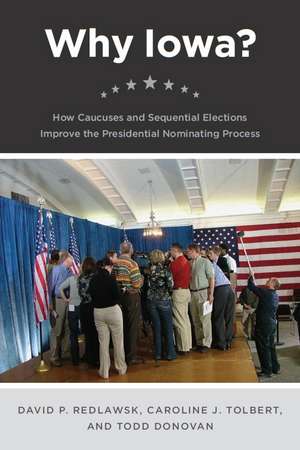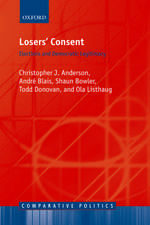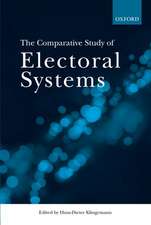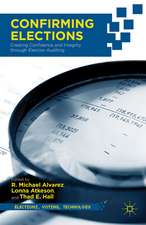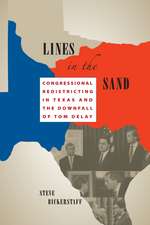Why Iowa?: How Caucuses and Sequential Elections Improve the Presidential Nominating Process
Autor David P. Redlawsk, Caroline J. Tolbert, Todd Donovanen Limba Engleză Paperback – 22 dec 2010
If Barack Obama had not won in Iowa, most commentators believe that he would not have been able to go on to capture the Democratic nomination for president. Why Iowa? offers the definitive account of those early weeks of the campaign season: from how the Iowa caucuses work and what motivates the candidates’ campaigns, to participation and turnout, as well as the lingering effects that the campaigning had on Iowa voters. Demonstrating how “what happens in Iowa” truly reverberates throughout the country, five-time Iowa precinct caucus chair David P. Redlawsk and his coauthors take us on an inside tour of one of the most media-saturated and speculated-about campaign events in American politics.
Considering whether a sequential primary system, in which early, smaller states such as Iowa and New Hampshire have such a tremendous impact is fair or beneficial to the country as a whole, the authors here demonstrate that not only is the impact warranted, but it also reveals a great deal about informational elements of the campaigns. Contrary to conventional wisdom, this sequential system does confer huge benefits on the nominating process while Iowa’s particularly well-designed caucus system—extensively explored here for the first time—brings candidates’ arguments, strengths, and weaknesses into the open and under the media’s lens.
Considering whether a sequential primary system, in which early, smaller states such as Iowa and New Hampshire have such a tremendous impact is fair or beneficial to the country as a whole, the authors here demonstrate that not only is the impact warranted, but it also reveals a great deal about informational elements of the campaigns. Contrary to conventional wisdom, this sequential system does confer huge benefits on the nominating process while Iowa’s particularly well-designed caucus system—extensively explored here for the first time—brings candidates’ arguments, strengths, and weaknesses into the open and under the media’s lens.
Preț: 290.12 lei
Nou
Puncte Express: 435
Preț estimativ în valută:
55.55€ • 56.98$ • 46.77£
55.55€ • 56.98$ • 46.77£
Carte tipărită la comandă
Livrare economică 27 februarie-13 martie
Preluare comenzi: 021 569.72.76
Specificații
ISBN-13: 9780226706962
ISBN-10: 0226706966
Pagini: 336
Ilustrații: 53 line drawings, 40 tables
Dimensiuni: 152 x 229 x 20 mm
Greutate: 0.45 kg
Editura: University of Chicago Press
Colecția University of Chicago Press
ISBN-10: 0226706966
Pagini: 336
Ilustrații: 53 line drawings, 40 tables
Dimensiuni: 152 x 229 x 20 mm
Greutate: 0.45 kg
Editura: University of Chicago Press
Colecția University of Chicago Press
Notă biografică
David P. Redlawsk is professor of political science and director of the Eagleton Center for Public Interest Polling at Rutgers University. Caroline J. Tolbert is professor of political science at the University of Iowa. Todd Donovan is professor of political science at Western Washington University.
Cuprins
Preface
Acknowledgments
part i. Framing the Argument
chapter 1. Why Iowa? Because the Rules Matter
chapter 2. What We Know and What We Don’t about Presidential
Nomination Campaigns
part ii. Caucus Rules
chapter 3. Iowa Caucus Rules
chapter 4. Candidate Campaigns in Iowa:
Grassroots or Mass Media Politics?
chapter 5. The Iowa Grass Roots: Participation in the 2008 Caucuses
chapter 6. Decided by the Few: Are the Iowa Caucuses
Representative?
with Daniel C. Bowen
part iii. Sequential Voting Rules
chapter 7. Effects of Iowa and New Hampshire in U.S. Presidential
Nomination Contests 1976–2008
with Rob Hunsaker
chapter 8. The Micro Foundations of Momentum
chapter 9. Participation and Engagement in 2008 Caucuses and Primaries
with William W. Franko
part iv. Changing the Rules
chapter 10 Reforming the Presidential Nomination Process
with Daniel C. Bowen
chapter 11 Why Iowa? Continuity and Change in Presidential Nominations
Appendix A: Multivariate Tables for Chapter 7
Appendix B: Multivariate Tables for Chapter 8
Appendix C: Multivariate Tables for Chapter 9
Appendix D: Multivariate Tables for Chapter 10
Notes
References
Index
Acknowledgments
part i. Framing the Argument
chapter 1. Why Iowa? Because the Rules Matter
chapter 2. What We Know and What We Don’t about Presidential
Nomination Campaigns
part ii. Caucus Rules
chapter 3. Iowa Caucus Rules
chapter 4. Candidate Campaigns in Iowa:
Grassroots or Mass Media Politics?
chapter 5. The Iowa Grass Roots: Participation in the 2008 Caucuses
chapter 6. Decided by the Few: Are the Iowa Caucuses
Representative?
with Daniel C. Bowen
part iii. Sequential Voting Rules
chapter 7. Effects of Iowa and New Hampshire in U.S. Presidential
Nomination Contests 1976–2008
with Rob Hunsaker
chapter 8. The Micro Foundations of Momentum
chapter 9. Participation and Engagement in 2008 Caucuses and Primaries
with William W. Franko
part iv. Changing the Rules
chapter 10 Reforming the Presidential Nomination Process
with Daniel C. Bowen
chapter 11 Why Iowa? Continuity and Change in Presidential Nominations
Appendix A: Multivariate Tables for Chapter 7
Appendix B: Multivariate Tables for Chapter 8
Appendix C: Multivariate Tables for Chapter 9
Appendix D: Multivariate Tables for Chapter 10
Notes
References
Index
